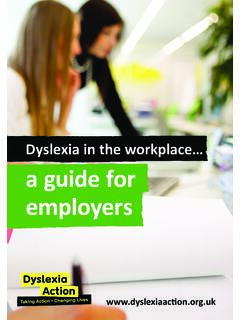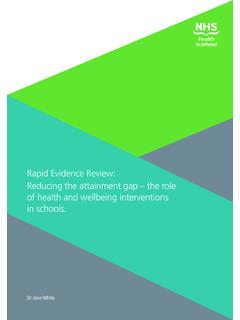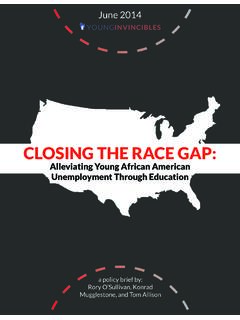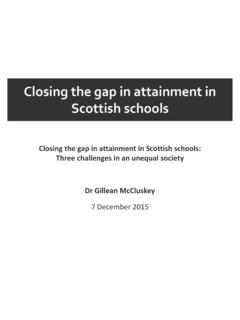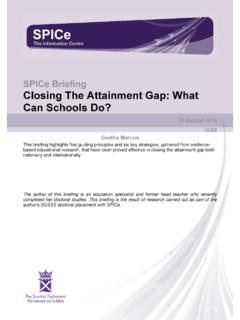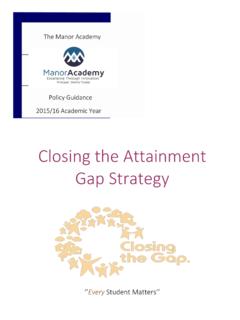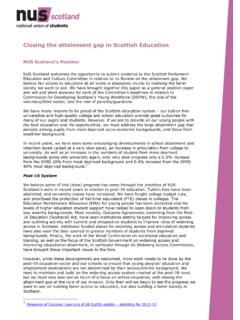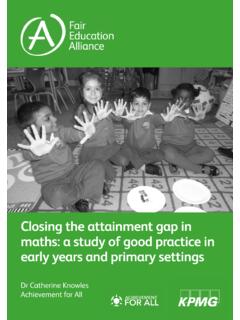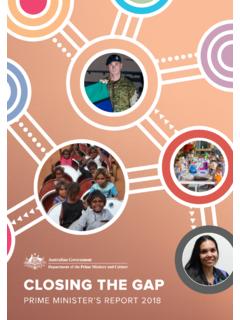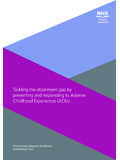Transcription of Closing the Gap: Research and Practice on Black and ...
1 Closing the Gap: Research and Practice on Black and minority ethnic student attainment in higher education ABSTRACTS Grimond Building, University of Kent Canterbury Campus 27th June 2016 Organised by: Lissa Davies/Elizabeth Buswell (01227) 816194. Session A Enhancing BME Student Skills and Employability Discussant: Duna Sabri Morning Presentations 11:50 Exploring ethnic inequalities in university graduate destinations Laurence Lessard-Phillips, University of Birmingham, Viki Boliver, University of Durham and Daniel Swain, University of Manchester The 2015 higher education Green Paper stresses the importance of increasing access for ethnic minorities to the UK's most selective universities as a means of increasing social mobility.
2 However, recent studies have shown that university graduates from ethnic minority backgrounds are less likely than otherwise comparable white graduates to progress to postgraduate study or to gain employment in a higher salary, graduate-level job after their degree (Lessard-Phillips et al 2014; HEFCE 2015; Zwysen and Longhi 2016). A separate set of studies has also shown that graduate outcomes vary significantly depending on subject studied and university attended over and above the impact of students prior attainment and social background characteristics (Power and Whitty, 2008; Hussein, McNally, and Telhajgg, 2009; Walker and Zhu, 2013; Macmillan, Tyler, and Vignoles, 2013).
3 However, no study to date has explored how graduates labour market outcomes are influenced by ethnicity in interaction with other individual-, course-, and institutional-level characteristics in a meaningful manner. The present study brings these two strands of inquiry together to explore how graduate outcomes are influenced by ethnicity in interaction with other student, course and institution characteristics. We analyse data about recent British graduates (2009-2013) from the Destinations of Leavers from higher education (DLHE) survey from the UK s higher education Statistics Agency (HESA).
4 We use a combination of truth table analysis and regression models to identify which particular configurations of student, course and institution attributes are associated with better and worse graduate outcomes for ethnic minority graduates relative to their white peers. Our findings change a key assumption of the government's social mobility policy agenda that graduating with a good degree from a highly selective university guarantees social mobility for students from ethnic minority backgrounds. Improving the employability of Black and minority ethnic students : a comparative international Research study Andrew Harvey, La Trobe University (Australia), Julia Clarke, Manchester Metropolitan University and Kimberley Reyes, University of Michigan (US) This paper will report on an international Research project on the employability of Black and minority ethnic students across three higher education systems: the United Kingdom, United States and Australia.
5 The project, funded by The Australian Government Department of education , aims to promote more equitable implementation of university employability strategies to promote academic attainment and graduate outcomes among minority students . A growing emphasis on employability as both a purpose and a responsibility of higher education is reflected in the explicit development of work-ready degrees; the articulation of graduate capabilities related to employability; a growth in industry collaboration, and in the extent and diversity of clinical and other placements; and the increasing use of graduate outcome data to measure teaching quality, through the proposed Teaching Excellence Framework, and institutional reputation (Field, 2013).
6 Research suggests that Black and minority ethnic students are more likely to be under-represented in work-based placements, study abroad (Universities UK, 2016) and optional career development activities and that many student groups face disproportionately poor graduate outcomes (Harvey & Reyes 2015, Jackson, 2013; Mestan & Harvey, 2013). Our project examines literature and specific graduate outcome data for Non-English speaking background (NESB) students in Australia, Black and Latina/o students in the United States, and Black and minority ethnic students in the United Kingdom.
7 We argue that embedding employability initiatives within mainstream curriculum will require addressing issues of diversity and the public good, acknowledging non-traditional conceptualizations of student cultural capital (Yosso, 2005) and the intersectionalities of class, gender and ethnicity (Moreau and Leathwood, 2006). This is particularly important within the UK context where an unintended consequence of the current political focus on the under- attainment of white working-class boys (Weale, 2016) may actually be the understating of ethnicity as a predictor of graduate employability outcomes.
8 The Access to HE diploma: A sustainable model for promoting Black and ethnic minority student participation in higher education . Julie Farmer and Joanna Parr, The Quality Assurance Agency for higher education (QAA) The Access to higher education (Access to HE) Diploma, regulated by the Quality Assurance Agency for higher education (QAA), offers a second chance to secure progression to higher education for adults who left school without the qualifications needed. Since QAA started collecting data in 1999, over a quarter of a million students with an Access to HE Diploma have progressed into higher education .
9 The majority of these students were aged 21 and over. The Diploma has a strong track record in supporting the progression and attainment of Black and ethnic minority students in higher education . In 2013-14, of the 23,085 Access to HE students that entered higher education institutions in England and Wales, 31 per cent were from Black and ethnic minority backgrounds (compared with 20 per cent of their peers with other qualifications).This paper will begin with a brief overview of the Access to HE Diploma and its history. It will then explore the role of the Access to HE Diploma in promoting Black and ethnic minority participation in higher education , presenting data concerning applications, entrants and attainment .
10 A real life perspective will be offered through discussion of recent case studies of Access to HE students and graduates from Black and ethnic minority backgrounds. The final part of the paper will be from a practitioner standpoint, considering some of the ways in which Access to HE tutors support Black and ethnic minority students in their Access to HE Diploma courses, applications to higher education and beyond. The role and effectiveness of career coaching in increasing self-efficacy, outcome expectancies and employability efforts of higher education students Joanna Molyn, University of Greenwich The study examines the above factors in the context of the changing role of higher education (HE) resulting from the government pressure to increasing students employability efforts (HEA, 2012).






